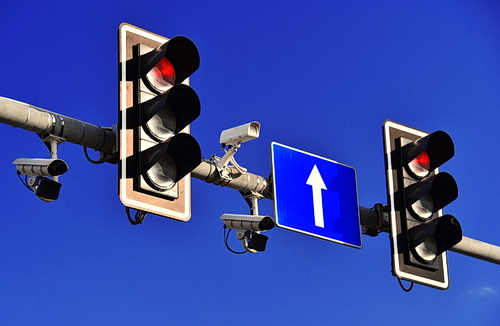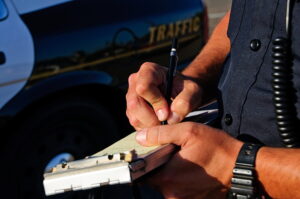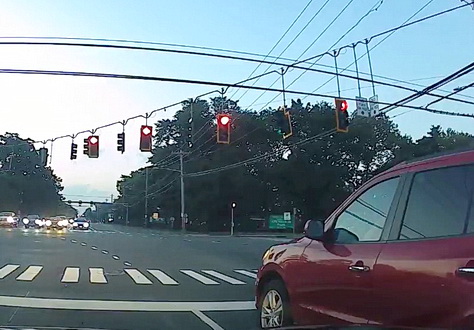
Photo: iStock
Note: I do not manage red light tickets. These articles are just for informative purposes only. Please refer to my home page if you need help with moving violations!
Red Light Cameras Have Always Been Contentious
From Floral Park to Southampton, communities in both Nassau and Suffolk counties are debating the pros and cons of the use of red light cameras. While they’re designed to improve road safety, many local residents don’t trust them.
These cameras monitor traffic at intersections and snap photos if a driver passes the crosswalk when the light turns red, even if it happens when the driver crosses it at the yellow light but the light turns red in the middle of the intersection.
Penalties

Any registered car owner caught on camera going through an intersection on red faces has an initial fine of $50, with an additional $25 added if not paid within 30 days, but no points will be added to your driving record. Contrary to receiving a ticket from a police officer for running a red light, you will get a minimum of three points plus fees.
Contention Against Red Light Cameras
According to a Florida study that covered comments from drivers across the country, the following arguments against the use of red light cameras are:
- More crashes are caused at intersections with red light cameras
Some studies have suggested this to be the case in certain areas of the country. - It is an invasion of privacy
Some folks are concerned about what happens to these videos after they are recorded. - Red Light Cameras are inefficient
Based on case studies in California, Virginia, Texas, and Pennsylvania shows that if the yellow light for an extra second, there could be a significant decrease in violations from red light cameras. This does not take into account however the timeframe as to when the driver sees the light change to yellow and when the driver actually reaches the intersection. This would consist of additional variables, such as the speed of the car and the reaction time of the driver. - It is a local government ploy to raise more money
Some people believe that the money acquired from red light violations does not go back to the community where they are located, such as improving the roads, etc. - Ticket recipients should be notified sooner
There is the contention that says it takes too long for the offending driver to receive the citation which gives the individual less time to respond. - What if the ticket doesn’t get to the offending driver?
There is no guarantee of delivery of the ticket to the driver using US mail. - There are no witnesses except a computer
The argument is that the camera could be malfunctioning. - Red Light Cameras do nothing to prevent accidents
Some say that despite the camera’s designated use as a deterrent, it is not successful in this category.
The entire Florida study can be found here.
Proponents for Red Light Cameras
The Insurance Institute for Highway Safety (IIHS) has stated the following:
- Red light running is frequent and at times deadly.
According to the National Council for Safer Roads and the National Safety Council, 9,227 people were killed across the country due to red light running. - Red light cameras discourage red light running.
An IIHS study found that red light cameras reduced fatalities in large cities by 21 percent. - Cameras don’t violate privacy.
Contrary to the argument above that these cameras violate privacy, when you get your license to drive, you are agreeing to abide by the rules, which include allowing cameras to record you when driving a vehicle.
Long Islanders Speak Out Against Red Light Cameras

Regardless of the arguments for or against red light cameras, some communities, like East Rockaway and Rockville Center, have spoken up and voted against having these cameras installed in their towns.
East Rockaway town officials actually voted down the red light cameras by a 2-to-1 margin. The cameras had been proposed after a teen was killed by a driver who ran a red light. However, the police chief in East Rockaway noted that the accident data didn’t show a need for the cameras. He said the department had been given no indication of where the problem intersections were.
Many residents in East Rockaway and Rockville Center also complained that they felt they were being unfairly targeted by these cameras. The residents complained that they were being fined even though they had no idea that the cameras were even present and officials are now considering the possibility of removing them.
In Nassau County, the Town Council of Long Beach discussed concerns about the red light cameras that are currently in use throughout the county. The cameras have been in place since 2016, and more than 25,000 violations have been issued since they went live.
A study was released by the county and found that the number of accidents at intersections with the red light cameras dropped by 35% when compared to the year prior to the cameras being installed. However, the county is having a difficult time collecting these fines.
Long Beach officials have also expressed concern over due process and whether or not the cameras are being used fairly.
New York City is Going to Review Its Red Light Camera Program
New York City has a lot riding on its red light cameras, bringing in $100 million in revenue for the city every year. However, the city is going to review its program as part of a more extensive review of alternative traffic enforcement tactics.
A spokesperson for the New York City Department of Transportation noted that the city is always looking for ways to improve road safety, as in the study regarding installing tolls below 60th Street in Manhattan.
New York City Mayor Eric Adams has expressed a desire to review the program, following concerns from his constituents that the cameras are being installed in places where accidents aren’t widespread. However, as of August 1st, the mayor is going along with the plan to turn on the cameras 24/7.
Previously, they were only being used on weekdays, between 6:00 AM and 10:00 PM. He and the NYC Department of Transportation have said that 59 percent of traffic fatalities were missed during the hours when the cameras were turned off.
Final Words: Finding the Right Solution for Your Community
You might agree with the concerns that many people have about red light cameras or you might find fault with the arguments.
This article is designed to neither condone nor condemn the red light camera system. It is simply ‘food for thought’ awareness of the pros and cons of the cameras. It is up to you, the taxpayer, to make the final decision.